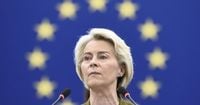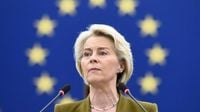On September 19, 2025, the European Union took a decisive step in its ongoing campaign to curb Russia’s war machine, unveiling its 19th package of sanctions against Moscow. The centerpiece of this new round? An accelerated ban on Russian liquefied natural gas (LNG) imports, a move that has sent ripples across European capitals and global energy markets alike. The decision, as reported by AP and ABC, comes at a time when the EU is under mounting pressure to starve the Kremlin of the fossil fuel revenues that have long propped up its military efforts in Ukraine.
European Commission President Ursula von der Leyen did not mince words as she announced the proposal. “Russia’s war economy is sustained by the revenues from fossil fuels. We want to cut these revenues,” she declared, adding, “So we are banning imports of Russian LNG into European markets. It is time to turn off the tap.” Her message was clear: the EU is determined to hit Russia where it hurts most—its energy sector.
The new plan moves up the full phase-out of Russian LNG imports by a year, shifting the deadline from January 1, 2028, to January 1, 2027. This acceleration, as noted by both AP and ABC, follows direct pressure from U.S. President Donald Trump, who has repeatedly urged European leaders to cut off Russian energy supplies more swiftly. The proposal is part of a broader package that also targets Russia’s so-called “shadow fleet” of aging oil tankers and major energy companies—an effort to close loopholes that have allowed Moscow to continue exporting oil and gas despite earlier sanctions.
EU foreign policy chief Kaja Kallas echoed von der Leyen’s urgency, stating on social media that the goal is “to speed up the phase-out of Russian liquefied natural gas (to be complete) by 1 Jan 2027.” She later elaborated on the broader aims of the sanctions, emphasizing not just the economic dimensions but also the humanitarian stakes. “Tearing children from their families and deporting them to re-education camps is beyond description. We will not let Russia weaponize childhood itself,” Kallas wrote, referring to Russia’s internationally condemned deportation of Ukrainian children since 2022.
The EU’s latest sanctions package is sweeping. According to The Associated Press, the measures must be endorsed by all 27 EU member states before they can take effect—a process that can be fraught with political wrangling and delays. The commission has proposed targeting 118 additional vessels from Russia’s shadow fleet, bringing the total number of sanctioned ships to over 560. Major Russian energy companies, including Rosneft and Gazprom Neft, are slated for full transaction bans and asset freezes. Other companies, particularly those supporting Russia’s military industrial complex, will also come under new restrictions.
“Major energy trading companies Rosneft and Gazprom Neft will now be on a full transaction ban, and other companies will also come under an asset freeze,” von der Leyen explained. The commission also plans to go “after those who fuel Russia’s war by purchasing oil in breach of the sanctions,” she added, targeting refineries, oil traders, petrochemical companies, and even third countries such as China suspected of helping Moscow circumvent existing restrictions.
The sanctions extend beyond the energy sector. Export restrictions on items and technologies that can be used on the battlefield are included, with a further 45 companies in Russia and elsewhere facing penalties for “providing direct or indirect support to the Russian military industrial complex.” In addition, the EU aims to make it easier to sanction individuals involved in the abduction of Ukrainian children—a response to widespread international outrage over Russia’s actions in occupied territories.
Yet, the path to enacting these sanctions is anything but straightforward. As AP and ABC point out, the EU has already passed 18 packages of sanctions since the start of Russia’s war on Ukraine, affecting more than 2,500 entities, including President Vladimir Putin, top officials, banks, ministries, and oligarchs. Travel bans and asset freezes have become routine tools in the bloc’s arsenal. Still, getting all member states to agree on new measures can be a marathon, not a sprint. Hungary and Slovakia, for example, have voiced strong opposition to any phase-out of Russian LNG imports, citing concerns over energy security and economic stability. Their resistance could complicate or even stall the approval process.
Europe’s reliance on Russian LNG is no small matter. According to the AP, Europe is the largest buyer of Russia’s LNG cargoes, accounting for about half of Moscow’s total exports. Russian LNG made up roughly 16% of the EU’s total LNG imports last year—a significant share that cannot be replaced overnight. The challenge for European policymakers is to strike a balance between punishing Russia and safeguarding the continent’s own energy needs, especially as winter approaches and demand for heating spikes.
Energy revenue remains the linchpin of Russia’s economy, allowing the Kremlin to fund its armed forces without triggering runaway inflation or a currency collapse at home. Von der Leyen underscored the impact of existing sanctions, noting, “Russia’s overheated war economy is coming to its limit,” and pointing to the persistent high inflation within Russia as evidence that sanctions are biting.
The broader package also aims to clamp down on those who facilitate sanctions evasion. The commission has set its sights on refineries, oil traders, and petrochemical firms, as well as entities in third countries that help Russia bypass restrictions. This multi-pronged approach is designed to close loopholes and ensure that sanctions have real teeth.
But what’s at stake isn’t just the flow of gas or the balance sheets of energy giants. The EU’s latest move is part of a larger effort to force Russia to the negotiating table and give peace a real chance. “We want Russia to leave the battlefield and come to the negotiation table, and this is the way to give peace a real chance,” von der Leyen said, calling on member states to quickly endorse the new sanctions.
For now, the fate of the 19th sanctions package rests in the hands of the EU’s 27 members. The coming weeks will test the bloc’s unity and resolve as it seeks to turn economic pressure into political leverage. With winter looming and energy markets in flux, the stakes could hardly be higher—for Europe, for Ukraine, and for the future of the international order.
As the EU edges closer to a full embargo on Russian LNG, the world watches to see whether these measures will finally tip the balance—or merely mark another round in a protracted economic and geopolitical struggle.





